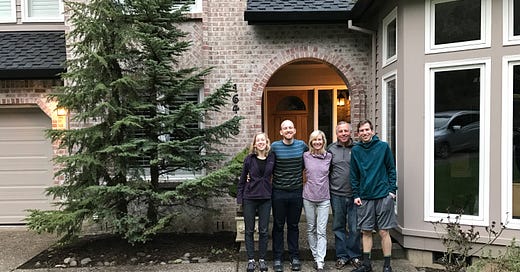The Way: Pulliam, Gomez, Eager and more share #GovernorGoals on Homelessness
PLUS: another cartoon from Jennifer Schuberth and John Urang; Mark Hester on the anniversary of 1/6/21.
Did you miss “The Liftoff”?
Read the latest version here
You shouldn’t have to be an “Insider” to be in the know.
Editor’s Note:
I called the same place home for more than 20 years. No doubts ever filled my head about where I’d sleep, where I’d study, and where I would find shelter and safety. That residential stability was an incredible gift.
But that’s the wrong framing. A place to call home shouldn’t depend on the good fortune of receiving a gift or winning the life lottery — especially when it comes to Oregon’s children. A stable home should be a guarantee for every Oregonian under 18. That’s not a reality for a Roseburg’s worth of Oregon students right now.
At least 22,000 students in Oregon are homeless (Roseburg has around 23,000 residents). Those kids face the mental and physical stress associated with not knowing where they’ll call home on a daily basis. That stress compounds and makes success in every other facet of life harder.
Homelessness must be a priority for the next governor. Absent meaningful progress in housing Oregon’s youth, seniors, and everyone in between, we’ll continue to be a state that’s falling far short of its potential. The individual costs of homeless are immense and quickly become societal costs. Investing in housing for all is not a Democratic or Republican stance, it’s simply a necessity that must become a reality for all.
I don’t agree with every solution proposed in the pieces shared in this version of the Way. You’ll probably have your own doubts about some of the ideas outlined below. But what’s essential is that the State not sit on its hands and accept the status quo. Let’s test ideas, study their results, and then iterate and scale the solutions achieving the biggest impact.
Let’s also have open minds to solutions from all parts of the political spectrum. At this point, no party can claim to have done a good job on homelessness in Oregon. I’ve been accused of engaging in too much “both-sideism” when it comes to creating a space for ideas from Rs, Ds, and Is and then asking readers to focus on the merits of the idea, not the issues they have with the author.
If you’re not willing to leave ad hominem attacks out of efforts to move the state forward, then this blog isn’t for you. If you can’t tell, I’m a little tired of people claiming to be solution-oriented then letting a personal squabble blind them from critically evaluating proposals to actually solve problems.
We can choose to make homelessness an issue that’s no longer sorted into Blue and Red colors but instead regarded as a priority by all. May the best idea — the idea that ensures every young Oregonian has a place to call home — win. May we all have the patience and persistence required to refuse acceptance of the status quo. May everyone grow up with a place to call home.
Here’s to a better Oregon,
Kevin
To look forward to:
Our #GovernorGoals series. Learn more about how you can help shape the future of our state here.
Adam Davis calls for a greater focus on building connections across differences.
Taylor Stewart offers another example of the important work being done by the Oregon Remembrance Project.
To interpret:
#GovernorGoals Submissions on Homelessness
Jessica Gomez states that homelessness in Oregon continues unabated, despite big investments. That’s why she proposes a comprehensive plan that addresses all facets of homelessness and housing insecurity.
Read it here.
Mayor Stan Pulliam argues that there is a point at which well-intended compassion devolves into simply enabling dangerous behavior. He says we are well past it, and it needs to stop.
Read it here.
Jared Wiener thinks the next governor and other public officials should focus on a critical component of the crisis and prioritize progress on that front.
Read it here.
Xander Levine writes that we need a governor that has legitimate plans – plans to not only help our city of Portland, but also the greater state as a whole.
Read it here.
Jeff Eager raises awareness of the tie between drug use and homelessness.
Read it here.
Additional reading:
Mark Hester looks back at January 6, 2021 and urges readers to consider remaining dangers to the health of our democracy.
Read more here.
Jenn Schuberth breaks down Oregon’s problematic literacy crisis and identifies one solution to improve reading rates.
Read more here.
Nathan Howard writes, “Nothing from my vantage point expands imagination, gives rise to empathy, and refocuses our outlook...like a relationship with psychedelics."
Read more here.
To do:
Share The Oregon Way with three friends
Join our editorial team or nominate someone to join
Tell us how we can improve!





